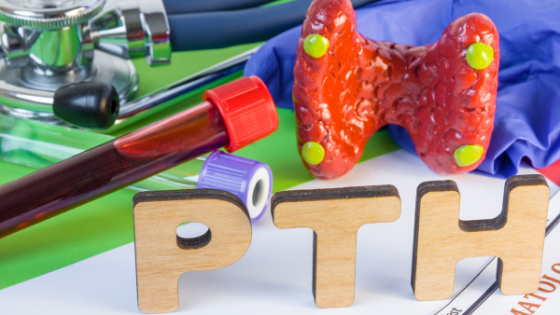*These statements have not been evaluated by the US Food and Drug Administration. This information is not intended to diagnose, treat, cure, or prevent any disease. Always consult with a qualified healthcare professional prior to beginning any diet or exercise program or taking any dietary supplement. The content on our website is for informational and educational purposes only.
Written By: Steve L. Belcher, RN, MSN, MS, DN-CM
PTH stands for parathyroid hormone. If you undergo kidney dialysis you will recognize it as one of your routine lab tests. PTH is a hormone made by the parathyroid glands. These glands are located behind the thyroid gland in your neck. This important hormone controls the balance of calcium, phosphorus, and vitamin D levels in the blood and bones. Too much or too little PTH changes the balance of these important minerals. When your body makes too much PTH this can cause a condition called hyperparathyroidism. When your body doesn’t make enough PTH, it can cause a condition called adynamic bone disease. When this happens, bones cannot store calcium and phosphorus properly.
What happens when kidney fails?
There are several reasons why an increase in PTH is common with kidney failure. As blood phosphorus levels rise, so do PTH levels, second the diseased kidney cannot activate vitamin D. Without activated vitamin D, calcium cannot be absorbed from your intestines into your blood. When the blood calcium level drops, the parathyroid responds by producing more PTH. Hyperparathyroidism (an enlargement of the gland) often develops. Then even more PTH is produced.
What are the signs and symptoms of hyperparathyroidism?
- Increased PTH levels
- Bones become weaken and may cause bone pain and fracture
- Calcification of tissues and organs can occur throughout the body. The lungs, heart, blood vessels, joints, and skin may be affected.
How can these problems be avoided?
- Keeping phosphorus levels below doctors’ recommendations is one important way to decrease problems. Both diet and phosphate binders can help.
- Medications with vitamin D can be given.
- Medications that work directly on the parathyroid to decrease PTH production are available. Ask your physician about these medications.
Can your PTH level ever be too low?
- Absolutely, If PTH level become to low this is known as adynamic bone disease or low bone turnover.
- Bone weakening and bone fractures are common.
- Low bone turnover may happen if the parathyroid glands become overly suppressed with vitamin D medication.
What can you do?
- Monitor your lab values, especially your calcium, phosphorus, and PTH. Know what your blood values are?
- Compare your blood levels to your dialysis facility recommended levels. Keep phosphorus, calcium, and intact PTH level at your facility recommended blood values.
- Work with your renal dietitian and kidney doctor to keep lab values normal.
About the author
Steven Belcher, RN, MSN, MS, is a dedicated kidney advocate who began his journey 20 years ago as a dialysis nurse. This job inspired him to help as many people with kidney disease as he could. Not only did he spent two decades caring for a patient’s physical and emotional needs in a clinical setting, but he also educated the public on the risk factors of kidney disease. Some of his many philanthropic successes include being a keynote speaker at the National Association of Nephrology Technicians/ Technologists (NANT), presenting at community spaces, and launching radio shows.
He now focuses his time entirely on his organization Urban Kidney Alliance, which educates the public about kidney disease. His goal? To lower rates of Chronic Kidney Disease in urban communities in Baltimore, Maryland, across the country, and globally through education and collaboration.
Steve has also written the book “HOW TO SURVIVE OUTPATIENT HEMODIALYSIS: A GUIDE FOR PATIENTS WITH KIDNEY FAILURE.” You can read the book review here.
Sponsored By: Kibow® Biotech

References




